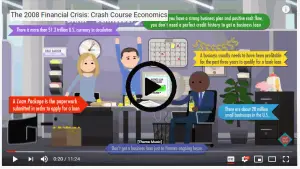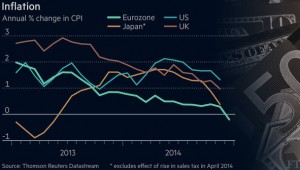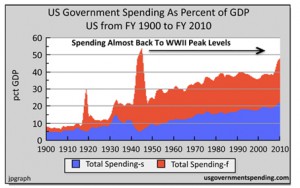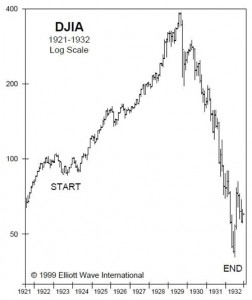Approximately every 50 to 80 years the world experiences an economic meltdown of catastrophic proportions. The one most people think of is the “Great Depression” of the 1930s. But the more recent example is the 2008 Financial Crisis. This crisis had the potential to be as bad as the Great Depression but Government action i.e. Unemployment Insurance and massive liquidity pumping was able to mitigate the effects somewhat. However, even with those actions, U-3 unemployment reached 10.6% and U-6 unemployment which is more like the measurement used in the 1930s reached 18%. What Caused the 2008 Crisis? The 2008 crisis is the culmination of a series of missteps and failed legislation. … [Read more...]
Is Global Depression and Deflation Underway?
In an article we published on August 16th, called Markets Crashing, Gold Rising the author said, "The probability of U.S. interest rate hikes this fall is now falling a rock. We are once again hearing the familiar call from Keynesian economists, including Paul Krugman, for more stimulus and debt. They acknowledge the trillions already printed and borrowed haven’t worked – but say it is only because it wasn’t nearly enough." As a matter of fact, Krugman has been beating the same drum since 1998 when he said, "The clear and present danger is, instead, that Europe will turn Japanese: that it will slip inexorably into deflation, that by the time the central bankers finally decide to loosen up … [Read more...]
In the United States, The Belt-tightening Has Just Begun
The Day of American Austerity: What Will It Look Like? In the United States, the belt-tightening has just begun Since the start of the European sovereign debt debacle, the word "austerity" has been bandied about a lot. It wasn't an everyday word, and may send some people to the dictionary. Merriam-Webster defines "austerity" this way: enforced or extreme economy. But even knowing this definition might leave one wondering how "austerity measures" relate to Europe's debt crisis. The Associated Press (5/13) provided this overview: Austerity has been the main prescription across Europe for dealing with the continent's nearly 3-year-old debt crisis, brought on by too much government … [Read more...]
What Happens to Gold if We Enter a Recession or Depression?
By Jeff Clark, Casey Research Mayan prophecies aside, many of the senior Casey Research staff believe that economic, monetary, and fiscal pressures could come to a head this year. The massive buildup of global debt, continued reckless deficit spending, and the lack of sound political leadership to reverse either trend point to a potentially ugly tipping point. What happens to our investments if we enter another recession or – gulp – a depression? Here's an updated snapshot of the gold price during each recession since 1955. … [Read more...]
How Wealth Can Simply Evaporate
In the following article Bob Stokes of Elliottwave explains why in times of credit expansion money is created out of thin air and in times of credit contraction money can simply disappear... no matter how much the government prints out of thin air. This results in a negative "money multiplier" as more money disappears than is created. See my article on Velocity of Money and the Money Multiplier for more information.~Tim McMahon, Editor Evaporation of Wealth on a Vast Scale How $1-million can disappear By Bob Stokes The bursting of the "debt bubble" which started in 2008 is far from over. It's the financial story of our age and it's happening before our eyes. The full scope is hard to … [Read more...]
Five Things You Need to Know About the Economy
By David Galland, Managing Director, Casey Research At any point during the recent negotiations in Washington over the debt, did you seriously think for even a second that the U.S. was about to default? Of course, in time the U.S. government (along with many others) will default. However, they are highly unlikely to do so by decree or even through the sort of legislative inaction recently on display. Rather, it will come about through the time-honored tradition of screwing debtors via the slow-roasting method of monetary inflation. Yet most people still bought into the latest drama put on by the Congressional Players – a troupe of actors whose skills at pretense and artifice might … [Read more...]
US Economic Situation “Intractable”
Over the last few years we've often mentioned the situation that the government has gotten itself into and wondered how it was ever going to be able to get itself out. The speculation has been that a period of hyperinflation might be the only option. In today's article David Galland editor of the Casey report discusses the economic bind the government is in and just what options it has. ~Tim McMahon, editor By David Galland, The Casey Report In describing the current situation in these United States, and in many of the world’s other superpowers, we here at Casey Research have often used the word “intractable”… as in, “impossible to resolve.” While that may not be technically … [Read more...]
Depression Within a Depression
By James Quinn, Contributor, The Casey Report Regular Casey Report contributor James Quinn is the head of strategic planning for one of the world's most prestigious business schools and the host of TheBurningPlatform.com blog. In this article, he is presenting historical indicators that may tell us what’s in store for the U.S. economy. In recent months, worshippers at the altar of Keynes have been hyperventilating over the possibility Congress will run a deficit of “only” $1.5 trillion in 2010. They have issued dire proclamations about a replay of the 1937-1938 Depression within the Great Depression. White House favorite and #1 Keynesian on the planet, Paul Krugman, declared that not … [Read more...]
What is the Ultimate Status Symbol in a Deflationary Depression?
Deflationary Depression: Ultimate Status Symbol The Biggest House? No. The Most Expensive Car? Try Again. By Robert Jay Ostentatious display defined the "Gilded Age" in the latter part of the 19th century. Most of the upper class in that period believed that if you had a big bank account, you should make sure everyone knew it. A century later -- during the bull market of the 1980s-1990s -- "McMansions" with BMWs in the garage became more common. Pulling out the plastic and enjoying instant gratification became pervasive. In most decades of the past century, families had to save for big ticket items, perhaps even save all year to ensure holiday presents under the tree. To take … [Read more...]
The Effects of Fiscal Stimulus are Wearing Thin
The following is an excerpt from Casey's Daily Dispatch... an ezine with thought provoking commentary that I thought you might find interesting. ~ Tim McMahon, Editor Words from the Wise By David Galland, I would like to share just a few snippets I think you’ll benefit from, starting with the latest posting from Ambrose Evans-Pritchard, which you can read in full here. Here’s an excerpt: Today’s release on manufacturing activity by the Richmond Fed is pretty ghastly, as you would expect given that the effects of fiscal stimulus are now wearing off at accelerating pace – before the happy handover to the private sector is safely consummated – and given that the structural … [Read more...]





